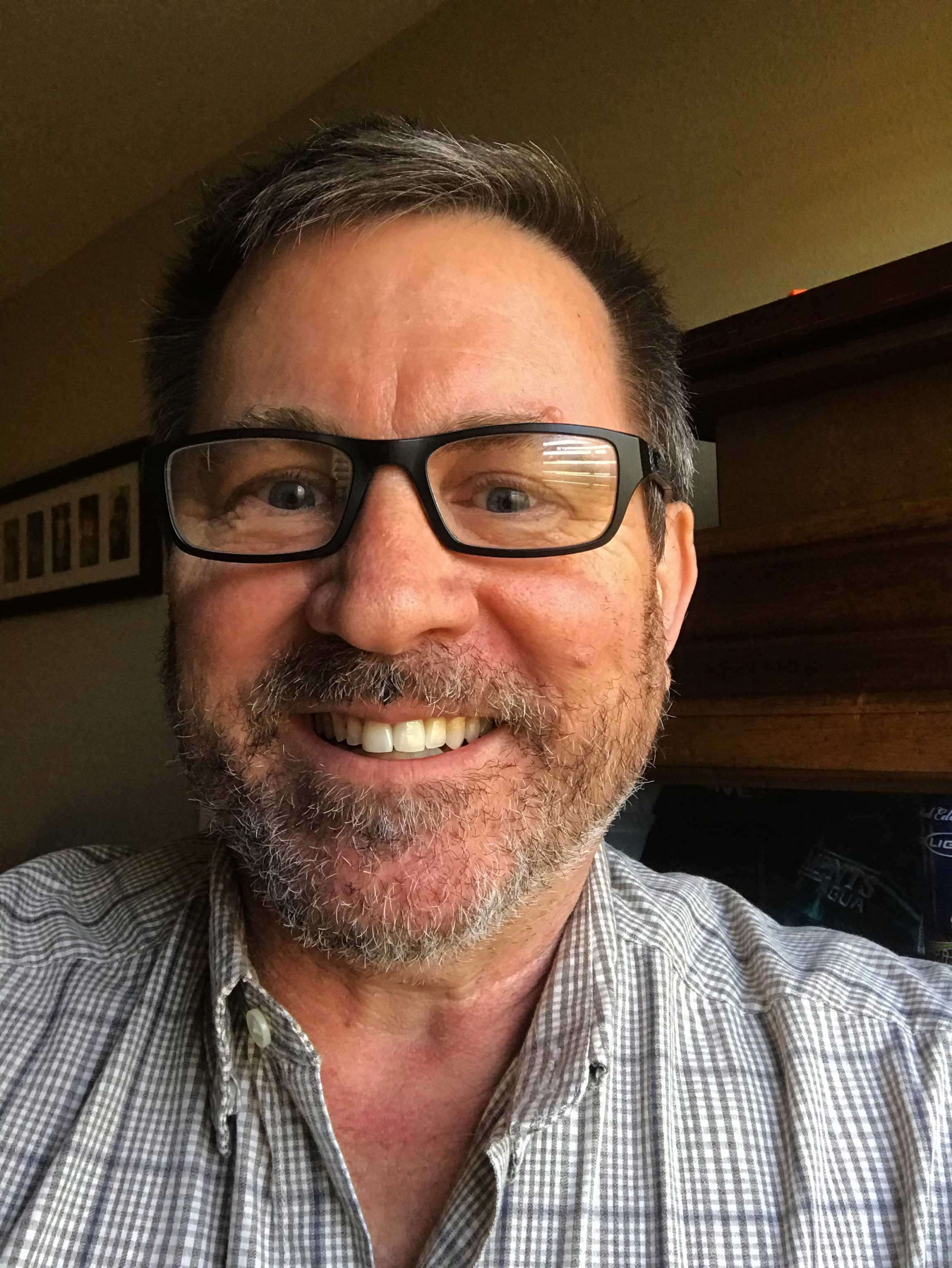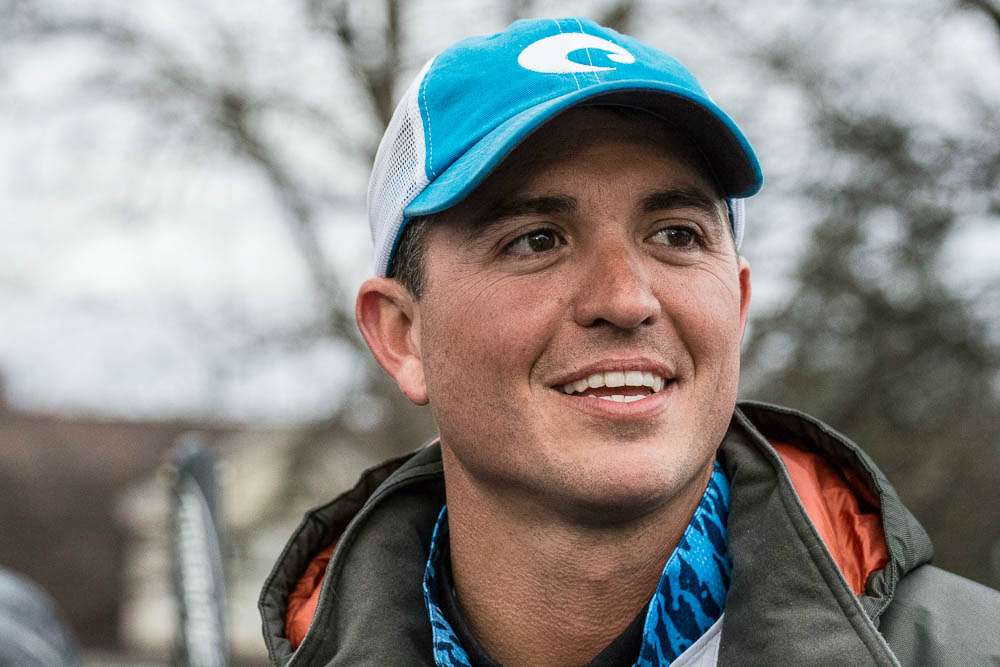
You can take the boy out of the country, but even a Classic victory can’t take the country out of Casey Ashley.
Ashley, two weeks removed from winning the 2015 GEICO Bassmaster Classic presented by GoPro, admits the winner’s whirlwind is stronger than he’d imagined, but he’s aiming to keep his feet on the ground, to stay the down-home angler from Donalds, S.C.
“You all know me, I’m just a plain ole’ country boy,” Ashley said. “I keep to myself.”
(To see Ashley’s post-Classic visit to JM Associates to tape ‘Winner’s Circle’, click here.)
Ashley knows being married to the title doesn’t really allow that, and he’s been busy trying to accommodate everyone in the receiving line. Winning the Classic is every angler’s dream, and he’s certainly not complaining when he admits he wasn’t quite ready for the hectic honeymoon that follows.
“At the Champion’s Toast, you wonder what it would feel like to win that trophy and stand there in front of your peers, your sponsors, and give that Classic speech, but boy, you don’t realize what happens after that,” he said. “It is definitely a whirlwind.”
After a good three hours of sleep the night after winning, he rose early to appear on two morning newscasts. With his phone blowing up, Ashley sought wisdom from Kevin VanDam, and he’s embracing KVD’s advice to “Do it all.”
In Little Rock to shoot the Winner’s Circle show, Ashley said he just caught up with all the correspondence, even employing girlfriend McKenzie Hartman to help organize his overflowing schedule and handle the constant calls.
Even his daily comings and goings around Donalds, a town of 348 with one gas station, a post office, small bank and one caution light, have been affected. Winning at home allows most everybody there to feel a part of it, he said, and Ashley’s polite demeanor has him spending a lot of time with residents wanting to congratulate him on making “Donalds proud” or “representing South Carolina well.”
“I can’t even go into a store,” he said. “Used to, it would take 10 minutes, run in, get you a drink, gas. Now, uh-uh. You better have a good solid hour. You can’t get away. I might not even know them, but they know me. They’re just super excited about it — seems like they’re more excited than I am.”
Being married to the Classic crown has also come with something old, new, borrowed and blue.
An old acquaintance Ashley and his father, Danny, fished against in a 2004 BFL tournament sent him a letter last week. The man, a lawyer, didn’t buck up for big fish in the 320-boat event, and Danny gave him some good-natured grief before and after.
“It wound up he had the biggest bag of the tournament and big fish, and he didn’t get nothing for it,” Ashley said. “He said he always remembered that, and he’s kept up with me and sent a letter. That was pretty cool.”
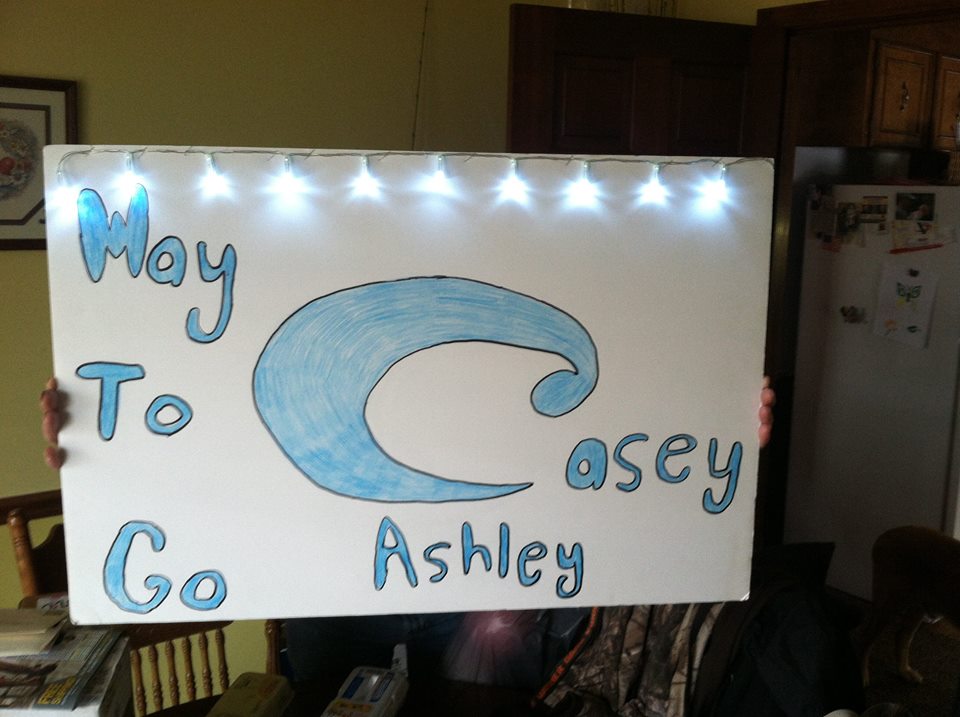
One package in the mail really touched Ashley. A young girl from the area sent him a poster she made, hand drawing the words “Way To Go Casey Ashley” in his main sponsor’s color.
“She’s only like 10,” he said. “She’s got the Costa C in my name, colored just like my boat. She rigged it up with Christmas lights and a battery deal, and they were blue. I’ve gotten some neat stuff from fans.”
Maybe not totally borrowed, but before the tournament his father handed Ashley a bag of the horse head underspin lures they’ve both built and fished for years. Danny joked that he’d probably win with them.
“I knew in the first hour of the day, it was going to play and it would play every day,” he said, “but actually to win it solely on this bait, I never dreamed that. It just don’t happen. Stars don’t line up like that for three days in a row.”
Many requests sent Ashley’s way have been to manufacture that winning lure. The heads are already patented, so dealing with that is just one example of how he wants to weigh options and take opportunities that arise slowly.
“I’d rather it be a slow-moving train,” he said. “I’m going from being this small town country boy that I am to living in the lights, from where I used to be, low-key, to about 10 notches up. And I want, especially from a sponsor standpoint, to gradually get into that.”
Winning the title is always said to present a windfall with more sponsor deals and paid appearances, but Ashley spoke of loyalty begetting loyalty. That’s how he prefers to do business.
“I’m sure I might get a few deals and it might give me a little bargaining power now that I am the world champion,” he said. “I’ve got great sponsors. I don’t have a whole lot of them, but I like it that way.
“My sponsors have been with me since I started. They put their butts on the line with hopes that I would be something some day, and now it’s happening, so it’s a good thing for them. I want to grow with the ones I’ve got. Loyalty is a big thing in this industry. This will be my ninth year. I know how it is. I like to deal with people, build a relationship.”
Apparently, Ashley has built on his relationship with VanDam, who checked on how he was doing this week. Ashley, who admits his victory would have been even sweeter if KVD was fishing, said the Classic winner getting a bye into next year’s event came up.
“I told him now I see why they put that in there,” Ashley said. “Possibly, pretty sure, you’re not going to be full mind, body and soul concentrating on what you’re doing.”
With the first Elite event next week, Ashley said he hasn’t had time to even think about the Sabine River, but he usually just shows up and fishes events except the Classic, the only one for which he’ll pre-practice.
Ashley spent plenty of time on Lake Hartwell before this Classic, saying he knew the fishery better than most everybody. He admitted it would have been more difficult to win if not for the frigid conditions that ruined the shallow bite for many. When practice started, he said fish were up and chewing.
“After the big arctic blast – that’s the coldest conditions I’ve ever had to deal with – you know it’s going to mess everything up,” he said. “As the tournament goes on — I was looking at the Sunday forecast, raining, dark, overcast day — I knew if it stayed like that, it was going to be on.”
It was, but he said one late move gave him some breathing room. The area where he caught his last keeper was next to his primary spot, and he had his eye on it.
“I had been watching that place all week. The birds never dove over there. There was nothing to tell you that it was alive, but no boats had hit it,” he said.
With a good limit, he went there and had a bite but left empty-handed. Late in the day he returned to where he started and then moved over to give the spot one last chance.
“I had only 30 minutes left. I noticed they were a little higher in the water column,” he said, catching one on his first cast that didn’t cull. “I know that place like the back of my hand. At the end of that flat, where it kind of makes a point and the channel cuts it, somebody has a cane pile stuck up out there. Ain’t nothing to it; it’s probably no bigger than a football. It’s just done. I fired over it. I turned the handle four times. I caught a 4 ½ pounder.”
He didn’t know it, but that put him over the 20-pound mark, the only one on Day 3. The bag had him confident, but he said several things put some doubt in his head.
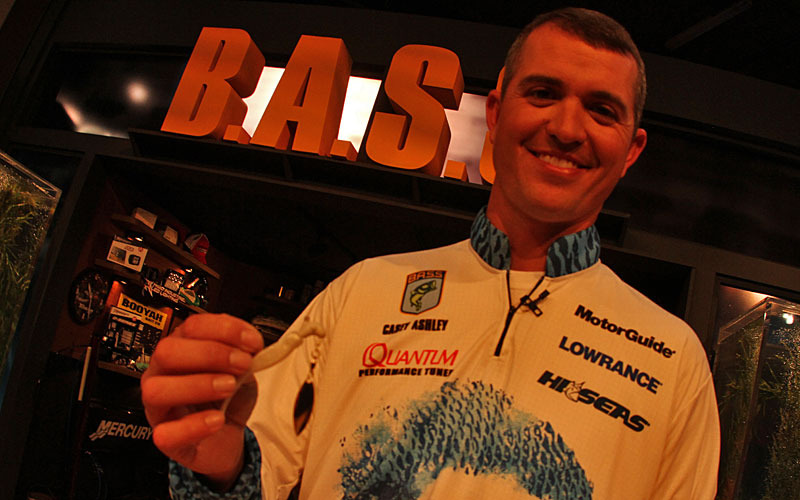
“I felt like I was going to scare the heck out of them,” he said. “I knew I had them good and somebody had to catch them to beat me. They bit this well for me, I’m sure they bit this well for somebody else — that comes into your mind.”
Even casual conversations with media played on him. Reporters usually access BASStrakk and know the approximate weights, but rules prohibit anglers from checking. Ashley had one of the new live cameras in his boat and had talked to the operator all three days about an elusive 5-pounder. The cameraman asked him several times on the final day what that sized fish would mean, and it got in his head.
“He was just trying to get me to talk, but he was wracking my brain,” Ashley said. “I’m thinking, how good are they catching them? Then (TV reporter) Robbie Floyd was asking me how much I had and how much I thought I needed. I’m thinking, it’s going to be close. How good did they catch them? I was a wreck.”
There were some hints in Ashley’s favor, like other anglers hanging their heads, but second-place finisher Bobby Lane had him a bit confounded. Ashley said he spoke with Lane before the final day, telling him his jig wasn’t working and if his underspin bite died he was considering running riprap, which Lane did in taking fourth at Hartwell in the 2008 Classic.
“He said he was going to fish it again, so I said, no I won’t do that,” Ashley said. “Then I talked to him on the way back and we knew it was going to be between him and me.”
Ashley, who started the day in fifth two pounds back of the leader and two pounds ahead of Lane, told Lane he had 18 or 19. Lane said he about 17.
“I know Bobby. If he said he’s got 17, he’s probably got 19 or he might have 20,” Ashley said. “He told me had a big one and didn’t know how much it weighed, 4 and 3/4 or it could be 6. He said it was the biggest one he’d seen all week.”
Backstage, the Super Six anglers had time to assess each other. Day 2 leader Takahiro Omori told Ashley he didn’t catch them good, and Ashley had a stronger inkling he would win when sixth-place finisher Mike Iaconelli congratulated him just before the sextet headed out on stage. Ashley won with 50-1. Lane was second at 46-15.
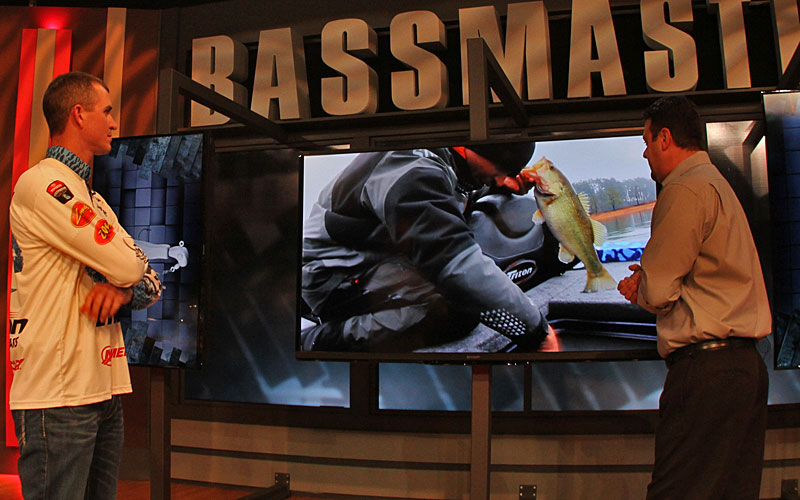
“The fishing was the easy part,” Ashley said, remembering everything he wanted to say as he accepted the trophy was more difficult.
“When you’re standing up on that stage and you hoist that trophy and the confetti’s flying, there’s about 2 billion things running through your mind,” he said. “And to be honest, I don’t have any idea how I even got a word out up there.
“So many thoughts, so many emotions, 30 years of my life getting to that point … being able to see all your friends and family out there in the crowd, then to say, I need to thank this person or I need to do this. I’m sure I left somebody out, but I’ll make up for it somewhere down the road. It’s hard to get through all that on stage.”
He did fine, and it’s sunk in that his name will forever be linked with the world title. Winning it at home means even more to him.
“That’s a great, great feeling,” he said. “Any fisherman’s dream is to fish the Bassmaster Classic, and to win the Bassmaster Classic. But for me to be able to win it in my hometown, on my home lake, really do something that nobody has done before, that’s pretty special. That’s something that will stick with me longer than anything.”

